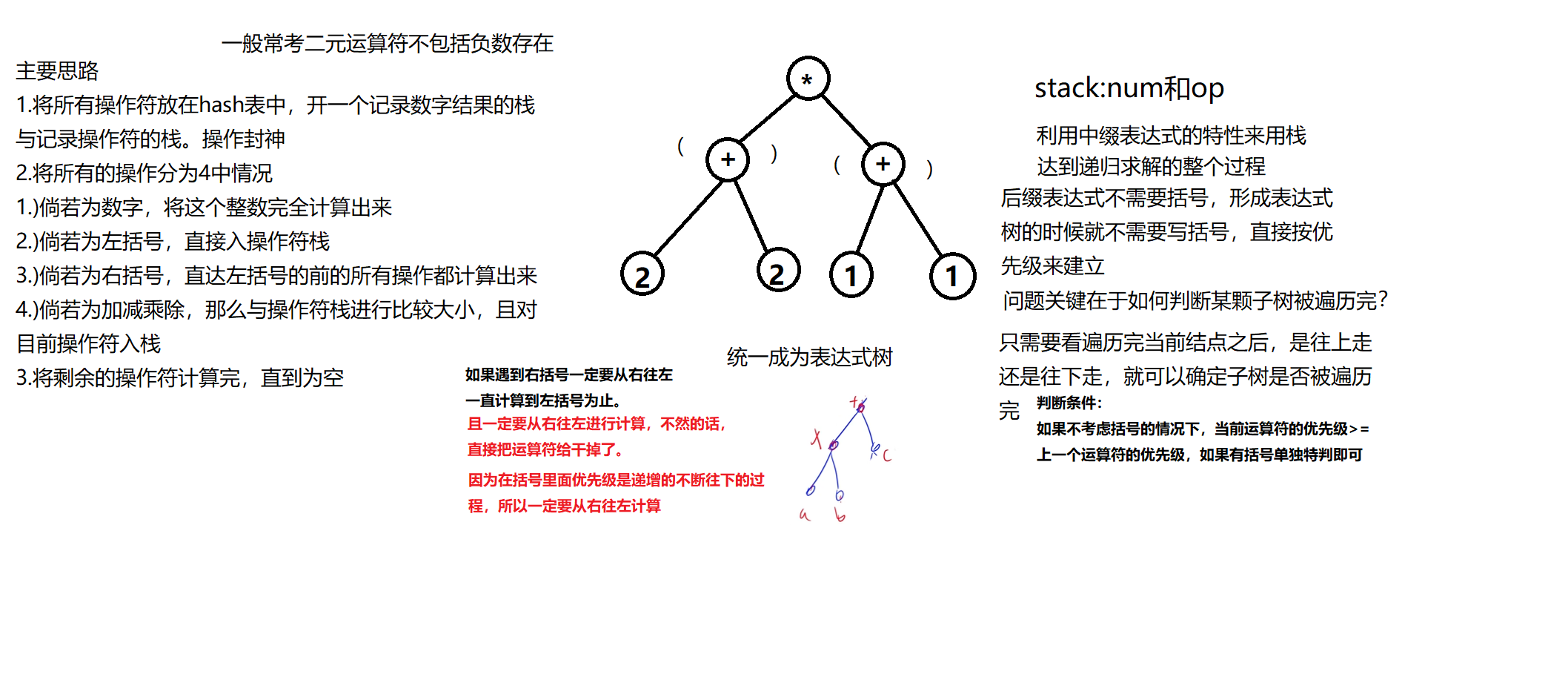栈的应用表达式树:
中缀表达式代码实现,另加扩展中缀转后缀表达式代码实现
原题链接: https://www.acwing.com/problem/content/description/3305/
这是我手绘图解:

中缀表达式
#include<iostream>
#include<cstring>
#include<stack>
#include<unordered_map>
using namespace std;
//num里面存放着运算结果以及运算的数
//op里面存放着操作符
stack<int> num;
stack<char> op;
//eval()计算目前的表达式的值
void eval()
{
//注意因为用的是栈,所以先去出来的是b,其次是a,防止加减法出现负数
auto b = num.top(); num.pop();
auto a = num.top(); num.pop();
auto c = op.top(); op.pop();
int x;
if(c == '+') x = a + b;
else if(c == '-') x = a - b;
else if(c == '*') x = a * b;
else x = a/b;
num.push(x);
}
int main()
{
unordered_map<char,int> pr{{'+',1},{'-',1},{'*',2},{'/',2}};
string str;
cin>>str;
for(int i = 0;i < str.size();i ++)
{
auto c = str[i];
//倘若这个字符是数字 且 连续出现数字,那么就需要将数字字符组合起来形成一个数
if(isdigit(c))
{
int x = 0, j = i;
while(isdigit(str[j]) && j < str.size())
x = x * 10 + str[j++] - '0';
i = j - 1;//更新i的值
num.push(x);
}
//倘若是左括号,那么就要入操作符
else if(c == '(') op.push(c);
//若是右操作符,那么直到做操作符里所有的数,都要进行一系列的运算
else if(c == ')')
{
while(op.top() != '(') eval();
op.pop();//且将左括号删除
}
//若操作的是+-/*操作符,则根据栈头与目前操作符比较大小,若栈头操作符大于等于目前操作符则进行计算
//且将当前运算符入栈
else
{
while(op.size() && pr[op.top()] >= pr[c]) eval();
op.push(c);
}
}
//将剩余的运算符进行计算
while(op.size()) eval();
cout<<num.top()<<endl;
return 0;
}
中缀表达式 转 后缀表达式写法
#include<iostream>
#include<cstring>
#include<stack>
#include<unordered_map>
using namespace std;
//num里面存放着运算结果以及运算的数
//op里面存放着操作符
stack<int> num;
stack<char> op;
//eval()计算目前的表达式的值
void eval()
{
auto c = op.top(); op.pop();
cout << c << ' ';
}
int main()
{
unordered_map<char,int> pr{{'+',1},{'-',1},{'*',2},{'/',2}}; //哈希存储<key,value>
string str;
cin>>str;
for(int i = 0;i < str.size();i ++)
{
auto c = str[i];
//倘若这个字符是数字 且 连续出现数字,那么就需要将数字字符组合起来形成一个数
if(isdigit(c))
{
int x = 0, j = i;
while(isdigit(str[j]) && j < str.size()) //从字符串中从左往右还原整型 1000
x = x * 10 + str[j++] - '0';
i = j - 1;//更新i的值
cout << x << ' ';
}
//倘若是左括号,那么就要入操作符
else if(c == '(') op.push(c);
//若是右操作符,那么直到做操作符里所有的数,都要进行一系列的运算
else if(c == ')')
{
while(op.top() != '(') eval();
op.pop();//且将左括号删除
}
//若操作的是+-/*操作符,则根据栈头与目前操作符比较大小,若栈头操作符大于等于目前操作符则进行计算
//且将当前运算符入栈
else
{
while(op.size() && pr[op.top()] >= pr[c]) eval();
op.push(c);
}
}
//将剩余的运算符进行计算
while(op.size()) eval();
return 0;
}
这里我再补充一点表达式的朴素转换法:
#include<iostream>
#include<string.h>
using namespace std;
typedef struct
{
char s[310];
int top;
}Stack;
int weight(char ch,int flag)
{
if(ch == '+' || ch == '-')return 1;
if(ch == '*' || ch == '/')return 2;
/*flag用于判别是否为栈内符号*/
if(ch == '(' && flag == 1)return 0;
if(ch == '(' && flag == 0)return 3;
}
void transform(char str[])
{
/*初始化栈*/
Stack a;
a.top = -1;
int i,f = 0,m = strlen(str);
cout<<"转换后:"<<endl;
for(i = 0;i < m;i ++)
{
/*筛选字母*/
if(str[i] >= 'A' && str[i] < 'Z' || str[i] >= 'a' && str[i] < 'z')
{
cout<<str[i]<<" ";
}
else
{
/*若栈为空,就先入栈*/
if(a.top == -1)
{
a.s[++ a.top] = str[i];
continue;
}
/*若为')'则从栈顶开始打印直到'('为止*/
if(str[i] == ')')
{
while(a.top != -1 && a.s[a.top] != '(')
cout<<a.s[a.top --]<<" ";
a.top --;
continue;
}
/*跟栈顶符号比较优先级*/
if(weight(str[i],0) > weight(a.s[a.top],1))
{
a.s[++ a.top] = str[i];
continue;
}
/*每次进行出栈操作时都要判断栈是否为空,而且,判断在操作之前*/
while(a.top != -1 && weight(str[i],0) <= weight(a.s[a.top],1))
{
/*用while循环为不用if语句来比较新读入的操作符与栈顶操作的权值大小*/
cout<<a.s[a.top]<<" ";
/*是因为当新读入的操作符的权值小于栈定操作符的权值时,也可能小于栈顶*/
a.top --;
/*下一个操作符的权值*/
f = 1;
}
if(f)
{
a.s[++a.top] = str[i];
f = 0;
}
}
}
while(a.top != -1)
{
cout<<a.s[a.top--];
}
}
int main()
{
char str[310];
cout<<"请输入中缀表达式:";
cin>>str;
transform(str);
return 0;
}
/*
中缀表达式转换为后缀表达式(思路)
1.创建栈
2.从左向右顺序获取中缀表达式
a.数字直接输出
b.运算符
情况一:遇到左括号直接入栈,遇到右括号将栈中左括号之后入栈的运算符全部弹栈输出,
同时左括号出栈但是不输出。
情况二:遇到乘号和除号直接入栈,直到遇到优先级比它更低的运算符,依次弹栈。
情况三:遇到加号和减号,如果此时栈空,则直接入栈,否则,将栈中优先级高的运算符依次弹栈
(注意:加号和减号属于同一个优先级,所以也依次弹栈)直到栈空或则遇到左括号为止,停止弹栈。
(因为左括号要匹配右括号时才弹出)。
情况四:获取完后,将栈中剩余的运算符号依次弹栈输出
例:比如将:2*(9+6/3-5)+4转化为后缀表达式 2 9 6 3 / +5 - * 4 +
————————————————
*/


向您学习!
总结的很棒!感谢大佬!